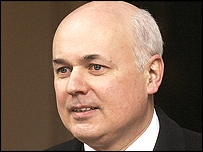
Mr Duncan Smith is a former Scots Guards officer
|
Calls for a state funeral for the last British World War I veteran would cause all sorts of difficulties, the government has said. Ex-Tory leader Iain Duncan Smith has been spearheading a campaign to recognise the passing of a generation.
His campaign has won support across politics from 95 MPs.
Responding to the calls in the Commons, Veterans Minister Don Touhig said identifying the last survivor itself was impossible.
Mr Touhig said some of the last known British veterans of the 1914-18 war opposed the idea of a funeral.
"It is the government's intention that all those who participated in that war to end all wars - as we thought at the time - should be suitably commemorated," he said.
There were essentially two options, said Mr Touhig.
"Either to provide a high-profile funeral for the individual as the representative of all those who served or, following the death of the last-known veteran, to hold a national memorial service or event for the passing of the generation."
'No complete list'
He added: "We are not sure who the last veteran is, or will be.
"Inevitably the numbers of surviving veterans of World War I will dwindle, but the numbers of those known to us do go up as well as down.
"For example, the announcement of the death of our last-known female veteran has prompted claims that there are two others still alive."
Mr Touhig said there was no complete list of surviving UK veterans and he doubted whether there ever would be.
Furthermore the government would have to take into account the wishes of any relatives who might desire a simple family funeral.
"A number of known World War One veterans have indicated that they, and their families, would not welcome any intrusion," he added.
National significance
Mr Duncan Smith said a national commemoration could be a "fall back" position if a state funeral ran contrary to the wishes of a particular veteran or his family.
"A state funeral is something peculiar and special in which the whole country takes part and in which we celebrate, commemorate and recognise the peculiar sacrifice not just as an individual but as an individual on behalf of their whole generation," he said.
State funerals are usually reserved for the head of state or figures of national significance such as Winston Churchill.

~RS~q~RS~~RS~z~RS~58~RS~)
~RS~q~RS~~RS~z~RS~58~RS~)